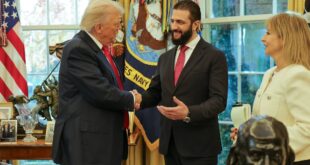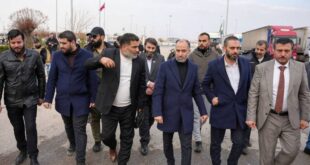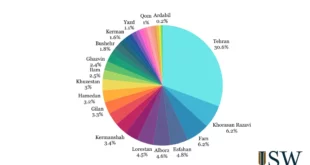 WASHINGTON (AFP) — The United States took new steps to isolate Iran by freezing the sale of all F-14 fighter parts, as officials told US news media they suspect Iranians masquerading as Americans were involved in a deadly attack on a US compound in Iraq.
WASHINGTON (AFP) — The United States took new steps to isolate Iran by freezing the sale of all F-14 fighter parts, as officials told US news media they suspect Iranians masquerading as Americans were involved in a deadly attack on a US compound in Iraq.
Iran bought 79 US-built F-14 “Tomcat” fighters before the 1979 Islamic revolution, and US officials they could get spare parts for the planes through third parties.
The Defence Logistics Agency ordered the freeze January 26 “given the current situation in Iran”, said agency spokesman Dawn Dearden on Tuesday.
The US move and the late Tuesday news report come as Washington increases pressure on Tehran to halt its alleged involvement with insurgents and sectarian fighting in Iraq — a charge Iran denies.
CNN, citing unnamed US government officials, said the Department of Defence is investigating whether a January 20 attack in the Iraqi city of Karbala was carried out by Iranians or by fighters trained by Iranians.
Attackers wearing uniforms resembling those of US troops and travelling in vehicles often used by US security contractors entered a secure US compound, killing five US soldiers.
“We believe it’s possible the executors of the attack were Iranian or Iranian-trained,” one of the officials told CNN.
“This was beyond what we have seen militias or foreign fighters do,” the official said.
An unnamed senior Iraqi official told The New York Times in Baghdad that the attackers held forged US identity cards, US-style M-4 rifles and hurled stun grenades.
The Iraqi officials cautioned to the Times, however, they had not found a firm connection to Iran.
Countering Iran has emerged as a prime objective of US policy as Washington struggles to stabilise Iraq and regain its footing in a region rife with both anti-American and sectarian tensions.
President George W. Bush told ABC television news Tuesday that he has no plans to invade Iran.
He also confirmed that he has authorised the US military to kill or capture Iranian agents plotting attacks on US forces in Iraq.
“We’ll deal with it by finding their supply chains and their agents and… arresting them, getting them out of harm’s way. In other words, we’re going to protect our troops,” Bush said.
Admiral William Fallon, Bush’s nominee to replace General John Abizaid as commander of US forces in the Middle East, told the Senate Armed Services Committee that Iran appeared to be developing military means to deny US forces access to the oil-rich Gulf.
“But I would note this is not a one-sided game, or a one-sided situation,” said Fallon.
“Iran is. . . critically dependent on its export of petroleum products for its economic vitality,” and those exports “go through the same Straits of Hormuz that they would potentially seek to deny us access to,” he said.
About a quarter of the world’s oil goes through the straits, which are bordered by Iran on one side and Oman and the United Arab Emirates on the other.
Experts say the closure of the straits would send oil prices soaring.
Fallon’s appointment, which the US Senate is expected to confirm, coincides with Bush’s ordering a second aircraft carrier strike group to the Gulf.
The arrival of the aircraft carrier USS John Stennis would raise the US naval presence in the region to its highest level since the 2003 invasion of Iraq.
Fallon said the president had not asked him to update war plans for Iran.
 Eurasia Press & News
Eurasia Press & News


